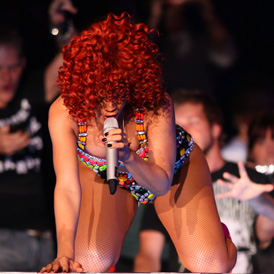Is pop music ‘descending into porn’?
As one of the men who launched Kylie Minogue’s music career says pop is now verging on porn, Madonna biographer Lucy O’Brien talk to Channel 4 News about the pressure to “sex it up”.

Mike Stock was one-third of all-conquering pop production house Stock Aitken Waterman (SAW), which gave the world Bananarama, Rick Astley and Kylie Minogue. The “Hit Factory” racked up more than 100 top 40 songs in the late eighties and early 1990s, including 13 number ones.
His new campaign is to reverse the music industry’s “slow but unmistakable descent into pornography”.
(Pictured: Rihanna performing in concert on June 16 in Minneapolis, Minnesota)
He picked out Rihanna, Lady Gaga and Katy Perry among artists who “have taken sexualised imagery, dance moves and lyrical content way beyond the limits of decency”. He also criticised Nicole Scherzinger’s performance on Britain’s Got Talent, which he said included “overtly sexual content on a family show”.
Pop writer Lucy O'Brien talks to Channel 4 News about the "pornification" of music:
Has pop music become more sexualised?
Definitely. Rihanna's S&M, Lady Gaga's Telephone, there is a link with soft porn. Videos have gradually been getting more explicit. Pop lyrics, too, have become more explicit. It's a great way of creating controversy and getting people to download/buy your single in an overcrowded market.
Madonna pushed the boundaries years ago so what's different now?
She certainly did. She's a complicated one. I think she always had an intelligent aesthetic behind the pop manipulation... she was testing taboos with videos like Justify My Love. On one level it appears as if she was just peddling the same old same old "sexy chick" persona, but actually her music and videos contained strong messages about women's empowerment and a female-centred fantasy and sexuality. She created the blueprint, and Aguilera etc followed (and imitated). Lady Gaga is interesting, but she reminds me too much of Madonna. But then again, maybe people older than me might have said, Madonna's interesting, but she's too like Mae West.
Is X-Factor/Britain's Got Talent "safe" family viewing?
I think on the whole it is very safe, apart from the young female artists who feel they have to "sex it up" in order to compete. I don't want to sound like a boring old fart, but my daughter is seven and has been copying the overtly sexy dance moves she sees on TV. That worries me. The relentless sexualisation of female singers sends out a distorted message - that to be successful as a woman you have to turn yourself into a sex object and be evaluated on that rather than your talent. I'd love my daughter to be inspired by women's work and real achievements rather than a digitised, artificial image of femininity.
Lucy's latest book is Madonna: Like an Icon
‘Campaign needs a Kanye’
Music blogger and cultural commentator Matilda Egere-Cooper told Channel 4 News Stock has a point but that big-name backing is needed for the drive to succeed.
She said: “On Rihanna, for example, I remember she did a performance on the X-Factor and it was a very catchy song. But the next thing you know she whips her skirt off and she’s wearing her bikini. It was definitely before 9pm.
“It was borderline but at that point I did think things were descending and becoming tasteless, so I agree with what Mike Stock said on that.”
Stock’s effort to clean up pop follows the Government-commissioned Bailey Report, published earlier in June, which recommended a series of steps to control the sexualisation and commercialisation of British children and teenagers.
He is calling on broadcasters to refuse to play videos or songs “they deem unfit”, saying it would force record companies to “to think again and clean up their act”.
The people who have power are the ones who can make this work – like a Kanye West or Alicia Keys. Matilda Egere-Cooper
But Matilda Egere-Cooper fears this will be hard to achieve.
“The people who have power are the ones who can make this work – like a Kanye West or Alicia Keys.
“Record labels aren’t going to change because they’re businessmen and women. It would take a lot for the labels to do something about it.”
The Cowell factor
SAW were known for their wholesome image but were one of the first production teams to actively market music to children. In fact Simon Cowell worked for Pete Waterman in the late eighties before building his own pop music empire, including the X-Factor and Britain’s Got Talent.
So is Mike Stock complaining about the modern music industry he helped create?
“There’s a thin line between frothy entertainment and then trying to cross it as much as possible,” Egere-Cooper says.
“Simon Cowell has a responsibility and I think this statement has been a long time coming.”
-
Latest news
-
‘Government responsiveness should be improved’ says infected blood inquiry chair4m

-
Infected Blood scandal: How UK failed on a global scale4m

-
International Criminal Court prosecutor seeks arrest warrants for Israel PM and Hamas leaders3m

-
‘Highly unlikely there was foul play’ in Iran president helicopter crash, says Tehran professor5m

-
Iran president Ebrahim Raisi dead in helicopter crash4m

-




